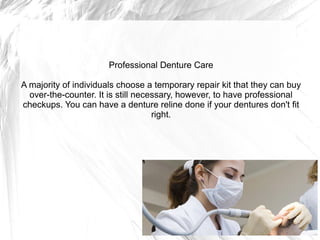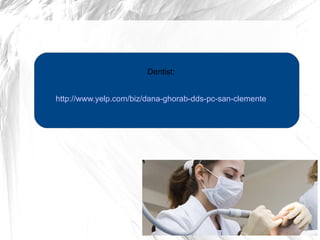Dentist- seniors dental care advice
- 1. Dentist - Seniors Dental Care Advice
- 2. Seniors often stop caring for their teeth. However, this is a big mistake. It is very important to take even better care of your teeth as you get older. If you have been getting dental care all of your life, don't stop now. There are specific dental practices that are critical for seniors to do on a regular basis.
- 3. Visit The Dentist Regularly It is very important that you continue making regular dentist visits. This is essential for your dental health overall, and can also help you to save money on gum disease treatment and other expensive dental procedures.
- 4. Professional Denture Care A majority of individuals choose a temporary repair kit that they can buy over-the-counter. It is still necessary, however, to have professional checkups. You can have a denture reline done if your dentures don't fit right.
- 5. Consider Using An Electric Toothbrush It is easy and fun to use an electric toothbrush. For seniors they are perfect because so many individuals have arthritis and other forms of decreased mobility.
- 6. Dental Implants When seniors have missing teeth, most of them choose to get dentures. However, there have been improvements made to dental care. Today, dental implants are a much better alternative, mainly due to them having a more natural look and feel.
- 7. Dental Risk Factors For Seniors Elderly teeth cannot withstand normal daily wear and tear. There are several reasons for this:
- 8. Lack Of Fluoride Fluoride is very helpful in strengthening teeth. It can really help with the prevention of tooth decay. Unfortunately, bottled water has become so popular that it has contributed to teeth enamel getting damaged. For seniors, it is a big risk factor. Gum Disease Ninety percent or more of seniors are estimated to have a receding gum problem. This condition exposes the roots and makes them a lot more susceptible to different diseases affecting the crown. For this reason, many seniors have problems with root decay.
- 9. Arthritis Many seniors suffer from arthritis. This results in reduced mobility, making it hard to do things that would be normal otherwise, like flossing or holding a toothbrush. Dry Mouth Dry mouth is a problem that is common among seniors. This is mainly due to the medication they take from having different health problems. It is necessary to have saliva to wash food particles away and to neutralize acidity which can cause tooth decay. Therefore, a dry mouth can be susceptible to cavities along with other kinds of dental problems.
- 10. Tooth Stains Plaque, just like cavities, can affect individuals of all ages. It hosts decay that can cause bacterial and also stains your teeth and makes them yellow. To avoid plaque buildup, bush and floss your teeth every day. Your dentist can also provide you with plaque rinse. Root Decay Root decay develops when a person has receding gums, which leaves the roots exposed. When exposure is prolonged, it can result in tooth decay. Obvious root decay signs are notches appearing around your gum line or a yellowish color.











